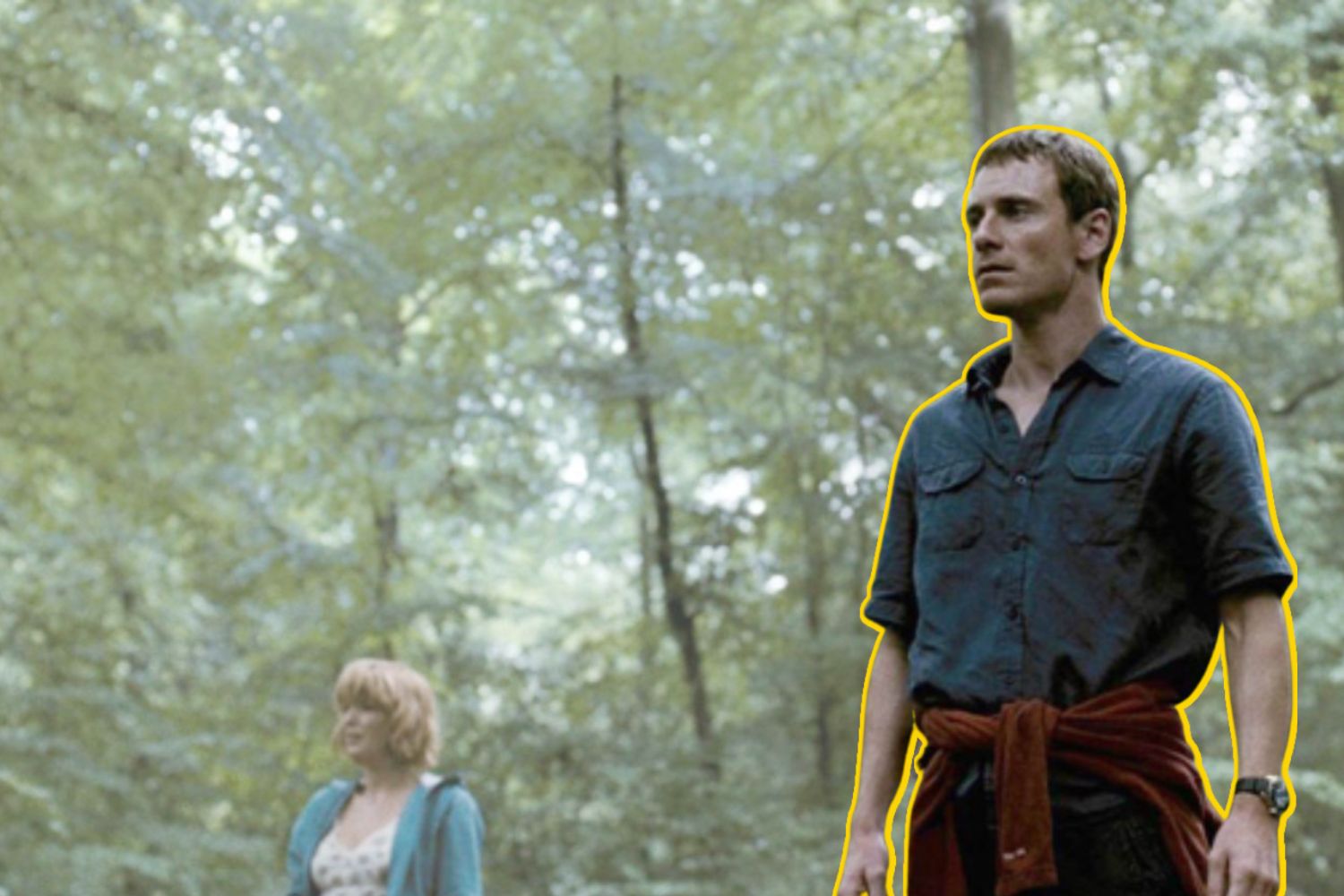Editorials
Broken Britain, Hoodie Horror, and the Muddled Class Politics of ‘Eden Lake’
February 24th, 2023 | By Emmett O'Regan

Class politics and social inequity have always been fertile ground for horror cinema. There’s little more terrifying than the very real societal structures that enforce the ever-widening divide between rich and poor. British horror film Eden Lake is a deeply disturbing look at these structures and their effects on the people who participate in them, on both sides of the economic chasm. While the violence and cruelty on display is troubling, more troubling is director James Watkins’ muddled political messaging, and how it only serves to further obfuscate the lines between victimhood and villainy in the face of economic disparity.
Eden Lake stars Kelly Reilly and Michael Fassbender as Jenny and Steve, a fresh-faced upper middle class couple in (then) contemporary Britain. The pair leave their comfortable suburban life for a lakeside weekend vacation in the countryside. The lake — a flooded quarry — sits at the edge of a forest, itself on the outskirts of a poor, small town. Jenny and Steve encounter a group of rowdy teenagers on the beach, who immediately begin to antagonize the outsiders. After a series of unpleasant interactions, the teens steal the couple’s car. Upon confronting the gang, Steve accidentally kills the dog of their temperamental leader, Brett (Jack O’Connell), setting off an increasingly violent chain of events in which the youths hunt, torture, and attempt to kill the vacationers.
They eventually succeed in killing Steve, but Jenny manages to make it out of the forest and back into town, exacting deadly revenge on a few of the ruffians in the process. She stumbles into a town party, and the community’s adults offer help. Unfortunately, Brett arrives at the scene, and all of the helpful townsfolk are revealed to be the parents of the now dead youthful attackers. Outraged by the death of their children, the now violent gang of parents proceed to kill Jenny, under the pretext of “taking care of their own.”
Eden Lake’s aggressive nihilism finds its origins in a British political movement that began in the mid-2000’s, spearheaded by the then out-of-office Conservative party. “Broken Britain” or “broken society” were terms coined by the aforementioned Conservative party to describe a perceived increase in social decay. Primarily, the responsibility of that purported societal degradation was placed at the feet of Britain’s poor and disenfranchised youth. Citing various hot-button notions as (apparently) unfettered crime — teenage pregnancy, antisocial behavior, rampant drug addiction, and abuse of economic aid programs — the “Broken Britain” alarmism was successfully used as a campaign tool, with central Conservative figures campaigning on the promise of “fixing” the supposedly shattered social order.
Naturally, art reflected (and continues to reflect) the sociopolitical zeitgeist. “Broken Britain” gave way to “hoodie horror” — an entire subgenre dedicated to the idea of the terrifyingly violent youth and their burgeoning psychopathy. The idea of a dangerous kid in a hoodie has its own ideologically fraught symbology in the United States, and while not necessarily embodying the same underhanded racial prejudice — though certainly not removed from it — in the U.K., its misguided power as a tool for fear-mongering is the same. Under the guise of gritty, cinema verité horror realism, “hoodie horror” in many ways served to promote and underline the strategic stereotyping and villainization of the poor. The style proliferated the dangerous depersonalization of the economically distressed as violent savages, ready to infiltrate so-called polite society at any moment. Eden Lake is often seen as a progenitor of the “hoodie horror” wave, debuting early in the “Broken Britain” movement.
It’s easy to write off filmmaker James Watkins’ intentions for the film as an indictment of the social strictures that resign the poor to a space of perpetual disenfranchisement. On one hand, Eden Lake can be interpreted as a condemnation of the way that social inequities and “the system” predispose the underserved to the type of cyclic violence inhabited by Brett, his cohorts, and their parents. But whether that was Watkins’ intent or not, the film plays in the opposite direction. Eden Lake “others” the inhabitants of the poor countryside town that upwardly mobile couple Jenny and Steve encounter. It’s the British equivalent of hicksploitation.
From the moment Jenny and Steve arrive, Watkins presents every resident of the town as gross, animalistic, or inhuman in some way. Parents are abusive and angry. Kids are loud and disrespectful, screeching and interrupting the couple’s quiet evening together. No one respects any type of normal social contract. Everyone is drunk and aggressive, getting in altercations or being openly antagonistic to the supposedly innocent central characters.
Really, though, Jenny and Steve are the encroaching party. While certainly undeserving of their eventual fates, the couple is imposing their presence and attitude on the town. Steve insists upon visiting the nearby lake, which has been fenced off. Once it was a public park, but now it is the construction site for a gated community development — the titular Eden Lake. Steve and Jenny essentially break into the quarry to benefit off the poor community’s natural beauty, with little respect for the inhabitants. They are the invading force, the proverbial constructors of the gated community.
There’s a key scene early on where Steve asks Brett and company to turn their music down — drum’n’bass blasting from a boombox. It’s interrupting their intended quiet day at the beach. Brett refuses, and his friends jeer at Steve. Jenny suggests the couple leave, but Steve refuses saying, “We were here first”. Of course, this is the central lie. Steve is the invader, staking claim to land that isn’t his. Land that people of his stature didn’t want until it was convenient for them. Steve and Jenny are the powers of gentrification pushing the poor teenagers away from their own resources, and shuddering when that provokes justifiable anger.
Watkins wrestles with traditional formulas of horror films (someone has to be the villain), and the idea that perhaps the invasion of a traditionally lower income space by a wealthy couple makes them pushy antagonists, not innocent protagonists.
What ends up happening is, rather than commenting on the perpetuation of economic underclass stereotyping by the “Broken Britain”/ “broken society” alarmism, Eden Lake indulges panic. It villainizes a financially-strapped community whose residents never wanted Jenny and Steve in their midst to begin with. The movie itself makes that clear. On their first night in town, the couple are ignored by the local barman as they try to order. They’re ignored by the only “good” kid they see, a studious boy named Adam (James Gandhi), who tells them that “his mother told him not to speak to strangers.” Hell, even their car’s GPS tells them, “at your earliest convenience, turn back.” Jenny and Steve don’t deserve to be tortured or killed, but they are the ones ignoring the requests of those who live in the place they’re imposing their presence on.
There’s a shocking scene in which the aforementioned Adam is burned alive by Brett and his cronies. Before being set aflame, Watkins points his camera at the back of Adam’s jacket, emblazoned with the word “England.” The pearl-clutching is evident. These “uncivilized” youths are literally burning England to the ground, with their hoodies, hip-hop, and antisocial behavior. Not once, though, does the picture pause to show the ever increasing class disparity — in this case represented by Steve and Jenny themselves — that might provoke this so-called antisocial behavior.
Eden Lake is effective in a contextual vacuum. Watkins is a skilled constructor of tension, and expertly uses a grim visual language to vividly portray a certain kind of nihilistic horror. But unfortunately, the most terrifying aspect of Eden Lake is its muddled class politics. What should be, “This is the horror that results from systematic oppression of the poor and the evils of gentrification,” instead becomes the tired, “Look at how scary these poor people are.” Intentional or otherwise, the most positive interpretation of Eden Lake’s messaging is to say that it reinforces negative and elitist stereotypes. But at worst, it’s an invocation of the most dangerous kind of dehumanizing rhetoric against those classes who already suffer the most.

